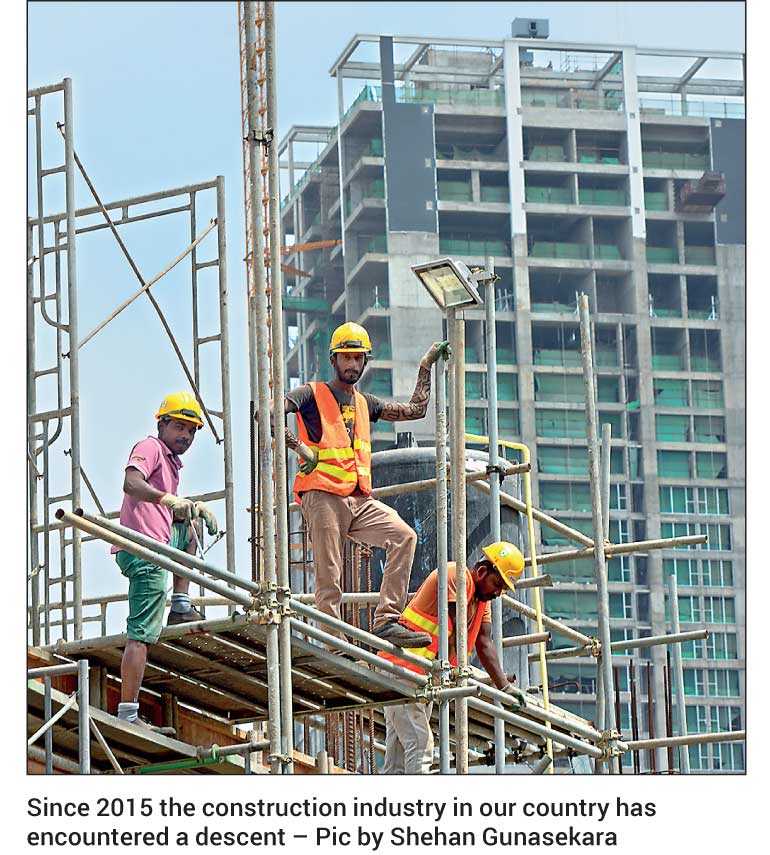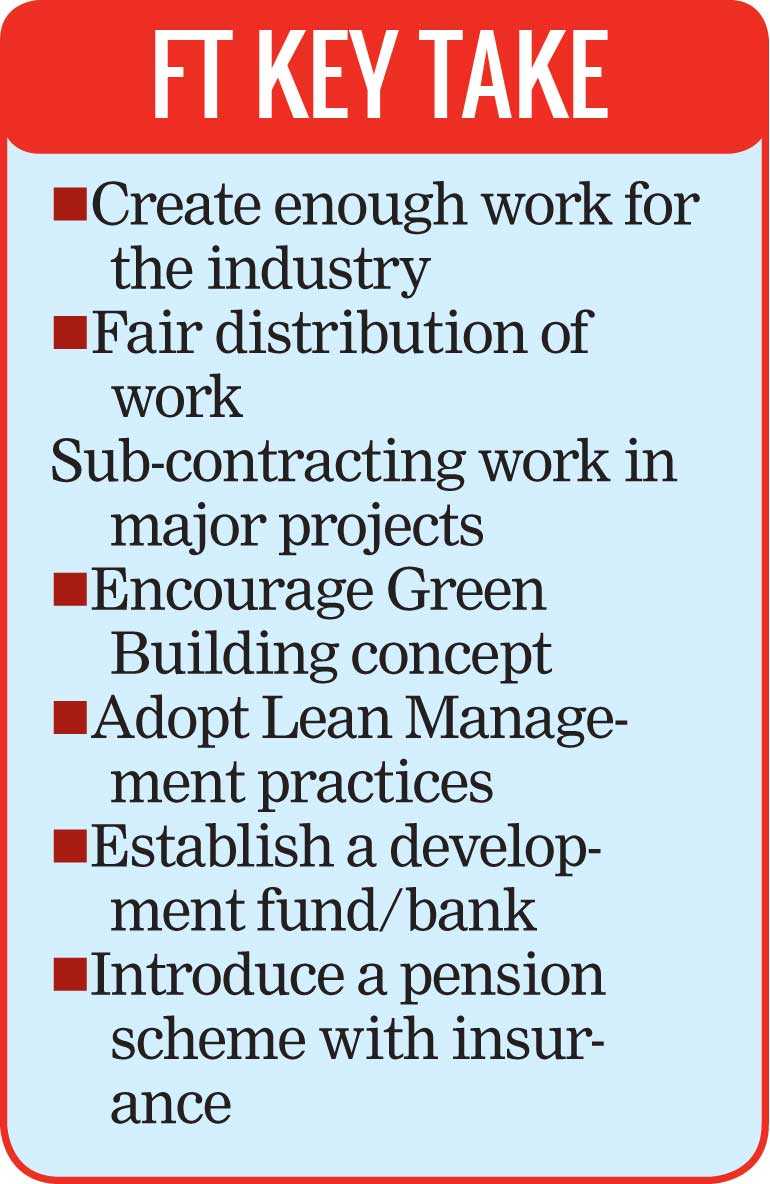Sunday Feb 15, 2026
Sunday Feb 15, 2026
Wednesday, 6 November 2019 00:40 - - {{hitsCtrl.values.hits}}
 Ceylon Institute of Builders organised a Members Forum to discuss the way forward for the crisis in the construction industry encountered in recent times. These findings were forwarded to the Chamber of Construction Industry to formulate a report, based on these issues and their proposed remedial actions, to be given to the presidential candidates contesting in the forthcoming election. With the consultation of 12 institutions, about 10,000 professionals and over 300 companies in the membership, the following main issues identified in the construction industry were included in the report. The Ceylon Institute of Builders President and Construction Chamber Vice President Dr. Rohan Karunaratne explained the concerns and proposed actions incorporated in the report to revive the construction industry in Sri Lanka.
Ceylon Institute of Builders organised a Members Forum to discuss the way forward for the crisis in the construction industry encountered in recent times. These findings were forwarded to the Chamber of Construction Industry to formulate a report, based on these issues and their proposed remedial actions, to be given to the presidential candidates contesting in the forthcoming election. With the consultation of 12 institutions, about 10,000 professionals and over 300 companies in the membership, the following main issues identified in the construction industry were included in the report. The Ceylon Institute of Builders President and Construction Chamber Vice President Dr. Rohan Karunaratne explained the concerns and proposed actions incorporated in the report to revive the construction industry in Sri Lanka.
Issues faced by the construction industry
1.Continuous decline in the industry: The 20% growth in the year 2012 was the highest growth rate reported in the Sri Lankan construction industry. During that period, that percentage was equal to those received in the developed countries in Asia. The contribution to the country’s GDP by the construction industry was 10.6% at that time.
Since 2015 the construction industry in our country has encountered a descent. As such, growth has decreased to 8% in recent times, with the contribution to the country’s GDP also being reduced to about 5%. It was not only small and medium companies, but also major construction companies that encountered many financial problems. The professionals who depend on the industry for their survival, as well other staff and construction workers are in danger of losing their jobs.
2.Very high construction cost: The very high cost for construction of a square foot in Sri Lanka is the main issue in the Sri Lankan construction industry. Sri Lanka’s cost of construction has only become second to Singapore rates in comparison with other South Asian countries. There are many reasons for the high cost in constructing a square foot. High cost of labour and construction raw material, high tax components and waste are some of them.
Proposed remedial measures
1.Reduce Government taxes: There are a few suggestions which can be proposed to reduce the high cost of a square foot in construction. One such suggestion is to reduce the very high taxes imposed on raw materials in the construction industry. Another suggestion is for the Government to start a scheme to attract and motivate youth for jobs in the construction sector.
2.Lean management: Furthermore, to minimise waste in the construction industry, implementing new techniques like ‘Lean Management’ practices used in other developed countries is proposed. Training in new technology is another method to reduce cost and upgrade the construction industry.
3.Green Building concept: Implementing a green concept in construction should be encouraged in all projects. This is another way of reducing the cost component and progressing with new technology in construction.
4.Create enough work: The Government is the main benefactor for the construction industry, being the main client who provides construction contracts. During the past five years, the Government has only offered marginal work to construction companies. The delay or non-payment of funds for work carried out for the Government was another problem faced by the companies. Construction companies also faced problems by obtaining loans from commercial banks on high interest rates for construction work and being unable to settle them on time.
5.Fair distribution of work: For any Government in power there should be a system where Government work should be distributed not only to major companies but also to the small and medium companies in a fair manner. The system should be transparent, with dynamic Government officials to release funds on time. Officers who have knowledge in construction should be appointed to handle Government tender boards involving construction.
6.Sub-contracting work: Some major construction companies who are awarded huge projects in the Government sector carry out work all by themselves without giving any subcontracting work to the small and medium companies. Government should introduce rules for the major construction companies who receive big Government tenders to allocate at least 30% of the work as subcontracting from such construction projects. The construction industry in Sri Lanka does not comprise only four or five leading companies, but about 2500 active ones.
7.Competition with foreign builders: There is a danger of huge foreign construction companies overrunning the local industry. These operate with various incentives offered by their own governments. Because of this, local construction companies attempting to compete with them encounter tremendous disadvantages. Any government that runs on a foreign loans or Foreign Direct Investments has to join the foreign construction companies. However, those foreign companies should have to join local companies with at least minimum 40% work sharing on construction projects. Likewise, all the construction contracts based on local funding should be offered to local construction companies.
8.Set up a bank or infrastructure development fund: China Construction Banking Corporation is the second largest bank in the world. This special bank contributed an enormous support to the rapid development of China. Sri Lanka should start such a bank or a fund which can support the construction industry in the form of a development bank immediately. In the last budget speech also there was a proposal that mentioned starting a special construction bank like a development bank with the help of the private sector. If such a bank is opened, the required capital would be about $100 million.
9.Recognition of construction services as an export: At present, some Sri Lankan companies carry out consultancy services and construction work in foreign countries without the support of the Government. This export service which brings foreign exchange to the country should be promoted. Yet the Government has not properly recognised this export service like the exports in other sectors. This is a field with ability to bring income to the country that can be developed. Therefore, initially the Government should recognise and accept export services in construction sector as an important sector and provide the incentives offered to export services in other sectors. A 20% tax levy has been imposed on the income earned from the construction work in foreign countries since 2017. It is better to give a tax relief to the construction export services sector for the next five years.
10. Problems in tender procedures: The Government procurement process is mainly implemented through TECs and PCs, which consist of Government officials. There had been many allegations of irregularities in several tender awards, although some of these allegations could be based on misrepresented facts. This can be solved by including a qualified person nominated by a relevant business chamber for every TEC and PC for a procurement costing over Rs. 100 million. Such a person should not have any conflicts of interest. This will facilitate greater transparency. In the past, there had been many instances of slow to no progress in development activities due to non-technically qualified persons as secretaries and chairmen respectively heading the ministries and statutory bodies involved in development work. On the other hand, the majority of the few technocrats who headed these institutions in the past had performed quite well.
11.Qualified officers for Tender Boards: Appoint qualified construction professionals to head the ministries and statutory bodies involved in development as secretaries and chairmen respectively for a fixed term of three years unless removed on disciplinary grounds.
12.Pension scheme for construction workers: This scheme is proposed to ensure the security of the construction workers in case of a disability or in the old age. It can be implemented through an insurance policy as a monthly pension payment. A lifetime pension for the worker would encourage school leavers to join the workforce in the construction sector.
13.Professionals for the National List: In China and Singapore, considered two economic wonders, one of the main reasons attributed to their success is the high number of qualified professionals in the highest echelons of power. In China even today the Cabinet is dominated by qualified technocrats. We can begin at least by nominating qualified professionals for up to 50% of the National List in the next Parliament.
The writer is the President of Ceylon Institute of Builders and Vice President of the Chamber of Construction Industry, Sri Lanka.